

PopEntertainment.com >
Features - Directors
> Feature Interviews F to J >
Curtis Hanson

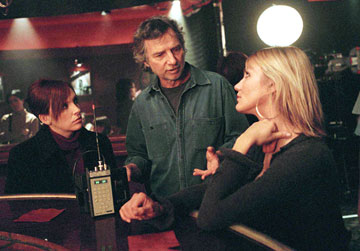 Curtis
HANSON
Curtis
HANSON
The director
steps into
a WOMAN'S WORLD
by Brad BALFOUR
Copyright ©2005 PopEntertainment.com. All rights reserved.
Posted: October 15, 2005.
Veteran director Curtis Hanson loves to confound people. As the
Oscar-winning director of L.A. Confidential, who would have thought he would take on a project
like 8 Mile – the fictionalized telling of cross-over rapper
Eminem's rise to success in the Detroit ghetto. Yet now he again defies expectations of him by doing what might
be called a chick flick – In Her Shoes.
Few people expected you to do an In Her Shoes after doing 8 Mile?
Maybe this is my penance
for 8 Mile. This time around, I am being hit with this question of
[what was I doing making a] "chick flick?" With 8 Mile, the
question at that time was all about [my credibility with] "the street" and
Eminem. I say the same thing now that I said back then, which is, that I
approach [each film] from the point of view of whether not I am interested
in it. If I am interested, then [I figure] other people will be. If they
are surprised that they're interested and surprised that they respond in
the way they do, then so much the better.
Was it a challenge that the characters in
In Her Shoes are Jewish?
I decided to make this
movie for the same reason that I made my last four movies which is that I
responded emotionally – to the characters and to the themes. The fact that
these three characters were all women was exciting and different for me.
As a movie-goer, it was also exciting because I've loved many
female-driven films in the past. I loved the opportunity to work with
three actors who would be necessary to get good performances from. The
Jewish thing--which I didn't think too much about in the beginning – is
part of the attraction of working with novels: you get the life
experiences that the novelist had. This was a very personal book for
author Jennifer Weiner, and I get to tap into that — so much the better
for me!
You played on the way that Cameron Diaz is often type-cast.
Yes, that was part of
the excitement for me and for her as well. She very much wanted to do this
part and took a significant pay cut to allow us to make it in Philadelphia
and in Florida. It was the opportunity to show what's behind that gorgeous
image. Cameron
is aware of the advantages of looking like she does, but she is also aware
of its limitations. One of the
wonderful [things] of her as a
human being is that she is truly is not motivated by career,
which is very unusual for an actor of her stature. Look how seldom she
works. This is her first picture since Charlie's Angels: Full Throttle
and she hasn't done a movie since we've finished shooting over a year
ago.
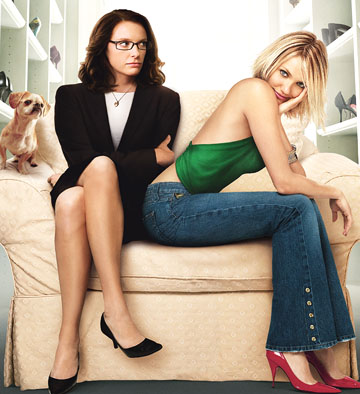 Who was cast first and how did you get Shirley MacLaine?
Who was cast first and how did you get Shirley MacLaine?
Cameron was first. When
I read the script, I read it knowing that she was interested in doing it.
The first thing I did after reading it was to sit down with her and talk
about it to see if she was prepared to go the lengths that she would have
to go to pull off this part — specifically its dark side: the
reprehensible behavior and the selfishness. I wanted to make sure that she
could go there without pulling any punches. Toni Collette was next for
obvious reasons: she's fantastic. The question with her was "what would
the chemistry be like between the two sisters?" and "Would you accept
their looks?" The answers came when they both got
together. Shirley was the last part of the trio. I considered everybody
for that part—known and unknown. But I always thought about Shirley for
the simple reason that it's impossible not to. I ended up sitting down
with Shirley and being very blunt with her. I told her, "You're big in every way
that's wrong for this part. This part is somebody who's quiet and hiding.
You have this talent and this personality
that you have
exploited so well over the decades." As I was saying this Shirley, her
eyes just started
flashing; I was wondering whether
she was feeling complimented or insulted.
Ultimately, she knew that she was being challenged. She's somebody who
loves a challenge — she's like a horse
that wants to test the barriers. Once she felt that she could trust me,
she craved this opportunity.
Was
there some irony in your head when you chose Cameron to play a Jewish
character?
As far as the Jewish
thing goes, my thought was, unlike the book, where they are all Jewish, I
felt that what would work here would be that her family would half Jewish
— that Shirley's daughter was not Jewish. When she died, their father then
married woman. He retreated to what might have been easier in the first
place. There's that tension going on of people that don't quite fit —
because that's what this story is about: two sisters who feel that they
don't fit anywhere.
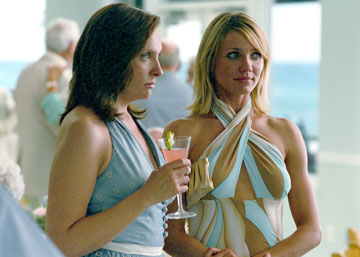 Has anyone else asked about this before?
Has anyone else asked about this before?
In Toronto, where we had
our junket, they didn't ask me in that way. What they did was comment how
unusual it was to see a Hollywood studio movie that actually identified
people as being Jewish. I didn't truly think that that was being bold, but
they seemed to think that it was.
Did you have any problems with photographers buzzing around Cameron?
It was not a major deal.
They are around like gnats with their telephoto lenses. You become aware
of them because it's distracting. The last thing that you want on a set is
distraction. So, we would park a van a certain way in order to block the
view.
Does Cameron Diaz or Toni Collette have any brothers or sisters?
Cameron has a sister who
is just getting married.
Did their siblings come to the shooting?
No. It's funny — there's
an intimacy in a movie that helps to create the closed environment that
can lead to creativity. On the other hand, it can lead to personal
problems. That's one of the reasons that relationships have a hard time
surviving in that world. It's like working on a political campaign where
you're working so hard with people all toward a common goal. Outsiders, no
matter how close they are to you, really can't be a part of it. That's
what it was like with this movie, which was so much of a personal movie
for everyone involved with it.
Do you have any siblings?
I have brother, so
there's that connection with the film. But this movie is about friendship
as much as it is about siblings. It is certainly about the yearning for
family that we can all share and about a yearning for connection, which we
all share. The larger issue is self-esteem and "what am I doing with my
life?"
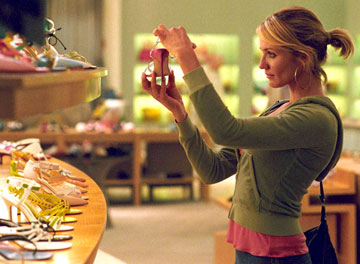 Some
directors write original screenplays while other write adapted ones. What
kind of director do you prefer to be?
Some
directors write original screenplays while other write adapted ones. What
kind of director do you prefer to be?
I do both. I have always
written and will always write. But I also enjoy working with other
people's material, particularly working from books because I love the life
experience that a novelist puts into a book. If I was limited to my
experiences, my filmography would be very skimpy [laughs].
Is that why directors end up making movies about making movies?
It could be. Staying
interested does keep one's creativity charged. For example, Shirley
MacLaine is somebody who is interesting because she is very interested. At
the drop of a hat, she can give her opinion about a wide range of
subjects. As they get older, people tend to become narrower in their scope
of interests. For filmmakers, it's a little bit more complicated than that
because there was a time when filmmakers were able to have longer, richer
careers than they seem to be having today. So many filmmakers that I loved
growing up as a film fan, made their best movies later in life—filmmakers
like [Alfred] Hitchcock, [John] Ford, and [Jean] Renoir. I think part of
that is because they were part of a system that allowed them to mix it up.
Howard Hawks could make a comedy – His Girl Friday – and then turn
around and make
Red River and then make To Have and Have Not or The Big
Sleep. Today, filmmakers are so encouraged in every way to do what
they did before if they were fortunate enough to do it successfully. The
results are less good because one becomes an imitation of oneself. And
it's easier to raise money if you say, "Look, I'm doing what I did
successfully over here."
Clint Eastwood is a good example.
Clint Eastwood is a
great example. To me, he is the exception that, in fact, proves the rule.
What he has done brilliantly is that he has used his movie-star cache to
allow himself the opportunity as a director to explore all sorts of
things. The results are what they are. Here is a guy who is in his 70's
and has made two pictures nearly back-to-back that are one of the best
pictures he has ever made. If there was ever a role model to aspire to in
contemporary filmmaking, it would be Clint Eastwood. I think everybody
would like to mix it up a bit. Hitchcock is the only one who, in a
premeditated way, set out to define himself through a genre. He not only
brilliantly executed his movies, but brilliantly achieved a marketing
thing with his persona. Most p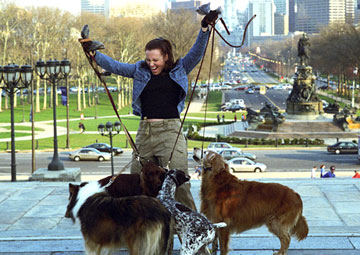 eople
want to have variety in their work just like actors do. When I felt like I
had an opportunity — and the opportunity was created by having financial
success with The Hand That Rocks the Cradle and The River Wild
— I very deliberately, in the most premeditated way you can imagine, said,
"Okay, I've got a chance to do something that I want to do as opposed to
just trying to get a picture that they want to do." In making L.A.
Confidential, I felt like I was spending my poker chips. When it was
done, I would have made a movie that I wanted to make and then I would go
back to the struggle. What happened, to my surprise, is that I still have
some more poker chips so that I could make another one.
eople
want to have variety in their work just like actors do. When I felt like I
had an opportunity — and the opportunity was created by having financial
success with The Hand That Rocks the Cradle and The River Wild
— I very deliberately, in the most premeditated way you can imagine, said,
"Okay, I've got a chance to do something that I want to do as opposed to
just trying to get a picture that they want to do." In making L.A.
Confidential, I felt like I was spending my poker chips. When it was
done, I would have made a movie that I wanted to make and then I would go
back to the struggle. What happened, to my surprise, is that I still have
some more poker chips so that I could make another one.
Both Bryan Singer's
The Usual Suspects and your L.A. Confidential
dealt with an ensemble of seedy but interesting characters and criminals;
yet each takes a very different approach. Did you feel that way as well?
The themes and the feel
of the two movies are very different; I was very aware of The Usual
Suspects because of Kevin Spacey being in it [as well]. But the movie
audiences felt one thing very similar: they felt like they were allowed to
be smart. They were engaged with the movies in a thinking way. Most movies
treat people like they're idiots because they go for the lowest common
denominator. Both of these movies flattered the audience by treating them
as though they were smart.
Despite the fact that both movies were acted predominantly by men, women
still related to them.
Women related very much
to L.A. Confidential because there is a romantic thing to the
picture and Kim Basinger's character is the emotional center of the movie.
She's the one character who knows the truth about herself and can see the
truth in the other guys.
Why do you work with different actors in every film?
That's not deliberate. I
love actors and I've had some really great collaboration with actors who I
would jump at the opportunity to work again with. But, I try not to let
that influence me in the casting process. I really try to go "Okay, who's
the one who can capture the essence of this character?" A lot of
filmmakers, like Clint Eastwood, have this family who goes from movie to
movie. I try to cast my department heads specifically for the movie that
we're going to make much the way that I would cast an actor.
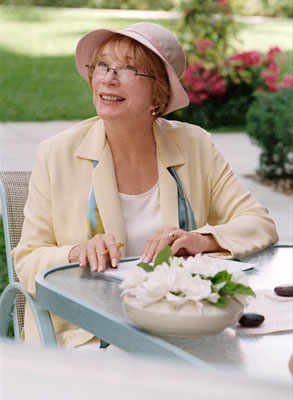 Is
your range of films a conscious choice
, so nobody can pin a label on you?
Is
your range of films a conscious choice
, so nobody can pin a label on you?
I do like it. I don't
consciously make choices based on the fact of being unlabeled, but I do
like to mix it up. I like to do things that take me into a different world
from one movie to another. That is deliberate.
Directors are like entrepreneurs starting a new venture with each film.
That keeps them fresh and in touch with what's going on. Does that make
you feel younger?
Yes. What I actually
have tried to do with myself is be my own benevolent studio head that’s
looking after myself. I've tried to look at myself as somebody under
contract. You are plunging into something with all your energy and
focus—and that definitely is like a rebirth. It keeps you vital. You are
having a unique opportunity to interact with wonderfully creative people.
What is your next project?
What's next is a movie
called Lucky You. It takes place in the world of professional
poker-playing. It's a relationship story that thematically deals with how
the skills for a card player are the opposite skills that you need for
human life. It stars Eric Bana, Drew Barrymore, and Robert Duvall.